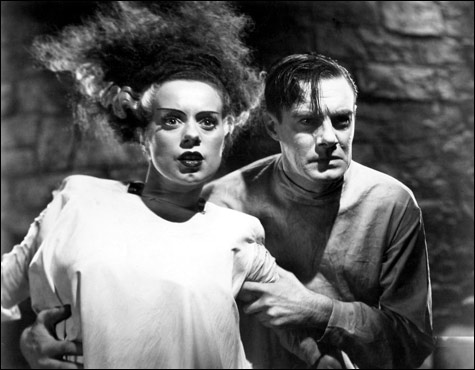
BRIDE OF FRANKENSTEIN: Elsa Lanchester is a hoot as the intended — but scarcely thrilled — bride. |
| “James Whale: Of Monsters, Melodrama and the Production Code” | Harvard Film Archive: September 11-21 |
James Whale's career as a purveyor of marvelous film entertainments was brief. It began in 1930, when Universal imported him from England to put the R.C. Sherriff WWI play Journey's End, which he had directed to great acclaim in the West End, on the screen. A decade later it was pretty much over, possibly because he was one of the few homosexuals in Hollywood who scorned discretion. Whale's output was small enough that most of it can be included in this series that the Harvard Film Archive has mounted in his honor.What he was famous for, of course, were his horror pictures: Frankenstein, The Old Dark House, The Invisible Man, and Bride of Frankenstein, all released between 1931 and 1935. They weren't like anyone else's, though subsequent directors have attempted to replicate his distinctive combination of creepy subject matter, visual high style, playful design and special effects, wit, and camp. The last two elements were added after FRANKENSTEIN (September 20 at 3 pm), which is done straight.
This is a bowdlerization of the great Mary Shelley novel; most of the ideas have been removed (though he put some of them back in Bride of Frankenstein), along with its beautiful structure. And most of the cast seem to be in the road company of a 19th-century melodrama. Yet it's unforgettable. No other Frankenstein has come close to its fairy-tale feel or the poetic power of its best scenes, like the one (cut for many years because it so unsettled audiences) where the Monster accidentally drowns the little girl who begs him to play with her. And as the Monster, Boris Karloff, who speaks only in moans and groans, gives what amounts to a great silent-film performance. The role made him a star — he was merely an intriguing question mark in the cast list of Frankenstein, but by the time Whale got him to play the drunken butler (another mute) in The Old Dark House the following year, he was listed as "Karloff," a single-named celebrity like the distinguished French stars of the era.
The Old Dark House (based on a J.B. Priestley novel), The Invisible Man (out of H.G. Wells), and Bride of Frankenstein (loosely adapted from the second half of Shelley's novel) are all suspense pictures laced with Whale's outrageous wit and humor. In THE INVISIBLE MAN (September 13, following The Man in the Iron Mask), you find it in the trick visuals as well as in Claude Rains's line readings (since Rains's character, Jack Griffin, has doused himself with chemicals, his image doesn't appear on screen until the last moment), and in the tongue-in-cheek dialogue by Whale's pal Sherriff and an uncredited Philip Wylie. The other two manage to be first-rate horror pictures while burlesquing the conventions of the genre. In THE OLD DARK HOUSE (September 11 at 7 pm), a quintet of travelers — among them a skillful Charles Laughton as a cockney industrialist clearly suggested by several George Bernard Shaw had created — take shelter from a wild rainstorm in a house full of loony birds: a prissy aristocrat (Ernest Thesiger), his religious-fanatic sister (Eva Moore), Karloff's tippling butler, a pyromaniac (Brember Wills), and a squeaky-voiced centenarian with facial hair like cobwebs (played in drag by Elspeth Dudgeon).